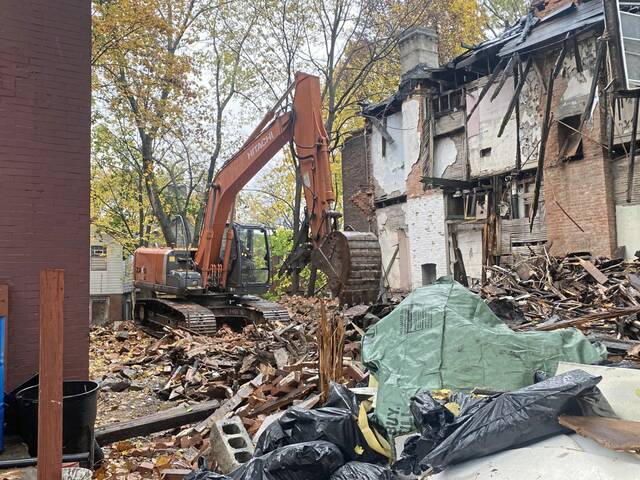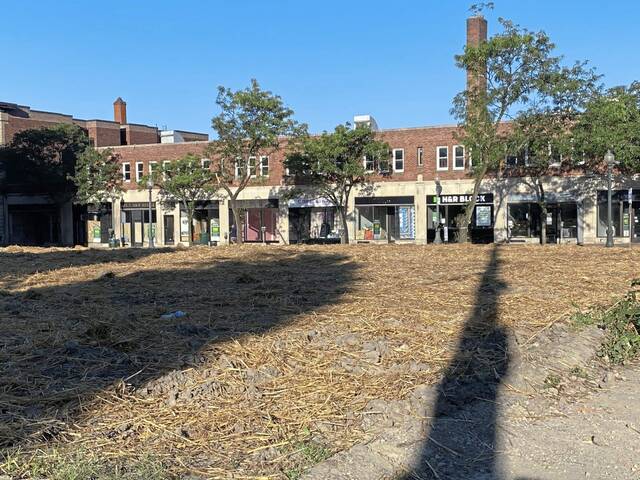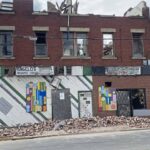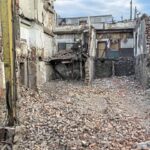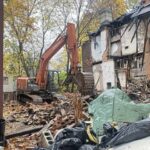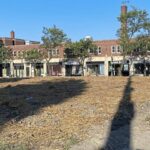Sunlight pours into the shattered roof of a four-unit Hill Avenue rowhouse — bricks and shingles fall onto neighboring properties.
An abandoned Glenn Avenue home sits with its glass windows broken out. Weeds snake up toward its second floor.
A 2,900-square-foot shell of a home on North Avenue has its front deck missing and rear deck collapsed. Cracks are visible throughout its aging foundation.
Welcome to Wilkinsburg in 2023.
Code enforcement officer Nawfel Bichiba watched images of each broken home, dozens of them, projected on a TV screen during a Oct. 27 hearing in Wilkinsburg’s municipal building. The borough plans to condemn 60 properties.
“The front of the property is completely caving in,” said Bichiba, as one property flashed on the screen. “The deck, the front porch, they’re completely gone.”
“You can literally see the skylight from the window,” he added about another. “The building, as a whole, could collapse at any moment.”
“They all bleed together,” a borough official quipped.
Wilkinsburg has been fighting blight aggressively for years, officials there say. Since at least 2020, the town has budgeted $300,000 a year to demolish abandoned properties. But it might be a Sisyphean battle — the Excel spreadsheet listing vacant properties in this 8,000-household town is 17 pages.
That doesn’t faze Borough Manager John Antinori. The Westmoreland County native worked in New York City for 25 years in internet marketing before returning to the area in 2019.
Wilkinsburg is his new project.
“There’s a lot happening here — significant new development, commercial and residential, and the ongoing efforts to clear the way for that,” he said. “Three years ago, when we talked about this, we spoke mostly about blight. Now we speak about blight and redevelopment.”
In 2022, Antinori said Wilkinsburg demolished 30 abandoned homes. State Senate Minority Leader Jay Costa chipped in this year for the fight, helping the borough secure a $635,000 grant to demolish 60 to 80 structures in 2023 and 2024.
There are about 250 vacant Wilkinsburg homes suffering from structural damage.
“I think it could be something that’s really helpful — it’s a big step forward,” said Costa, D-Forest Hills. “Whether you’re creating side yards for folks or opportunities for people to build a new home, I think it’s all very important.”
“It’s not fair just to keep them up till they fall down,” Wilkinsburg Mayor Dontae Comans said. “Being ahead of that curve, instead of waiting for it to happen, is the best thing.”
Other officials are taking note.
Pittsburgh Mayor Ed Gainey and Gov. Josh Shapiro have lauded Act 4, which aims to make it easier for municipalities to combat blight.
The new law, which Shapiro signed July 5, makes some process-related changes to better allow area land banks to secure blighted, tax-delinquent properties more quickly and efficiently, officials said.
“By eliminating unnecessary regulations and helping municipalities revitalize blighted property for productive use, Act 4 builds on Gov. Shapiro’s commitment to growing our economy and strengthening communities across the commonwealth,” Shapiro spokesman Manuel Bonder said.
‘They don’t want gentrification’
Wilkinsburg is a study in contrasts.
While homes in the borough, just two square miles, flourish on its eastern and western edges — respectively, in Blackridge and Regent Square — the center is soaked through with blight. An underperforming business district runs largely along the Penn Avenue corridor.
Last year, less than 1 in 3 residents owned their own home in Wilkinsburg instead of renting, far below the U.S. average of 64%, census data showed. And the median value of owner-occupied homes doesn’t break $99,000, well below the U.S. average of $244,900.
Council President Denise Edwards says the town has good bones and offers something other communities recently redeveloped along Penn Avenue — she cited East Liberty and Garfield — cannot: affordability.
The borough’s median rent lingered around $870 from 2017 to 2021, well below the national average of $1,163, census data showed.
“We’re definitely seeing investment — and that’s associated with affordability,” Edwards told TribLive. “Residents have made it clear. They don’t want gentrification, no matter who’s in charge.”
Edwards points to investment in the borough’s historic train station, where several local businesses operate. The town plans to rebuild the cobblestone street in front of the station in 2024.
There’s the physicians’ offices that plan to move into Penn Avenue’s vacant CVS store, Edwards said. Or the new Aldi supermarket planned on Penn Avenue near the Martin Luther King Jr. busway.
There’s also proposed redevelopment near the intersection of Wood Street and Wallace Avenue, Edwards said. There, a private property owner — Sue Wei, owner of the popular How Lee restaurant in Squirrel Hill — demolished an entire city block of empty apartments and burned-out retail stores.
Wei said she’s still considering her options. She likes the idea of a two-story building with apartments above and retail or office space on the street level.
“I’m just thinking Wilkinsburg one day will be very prosperous — they just need time to get things to come together,” Wei told TribLive. “I’m interested in how they’re going to turn around that town. I think it could be a jewel.”
Aaron Donald’s involvement
Wei isn’t the only private developer with eyes on rebuilding Wilkinsburg.
Donald Development, a firm led by NFL defensive tackle and Pittsburgh native Aaron Donald, is seeking out-of-state funding for a $17 million Hunter Street redevelopment plan that a company spokesperson called “a catalyst for the community of Wilkinsburg.”
The project aims to construct 38 affordable housing units in “garden-style townhouses,” as well as provide space for a new community center, spokesperson Ryan Sanders said. Work could start as early as the second quarter of 2024.
Donald is an area success story.
Born into a working-class family in Pittsburgh’s Lincoln-Lemington neighborhood, he was star football player at Penn Hills High School before playing college ball for the Pitt Panthers. Since joining the Los Angeles Rams, he has been honored as Defensive Player of the Year a record three times and has been named to nine Pro Bowls. He has a Super Bowl ring.
Antinori estimates there are at least four redevelopment projects in the borough pipeline, including a 40-unit residential building, with ground-floor retail, set for construction near the intersection of Penn Avenue and Center Street.
That Penn Avenue site has been leveled and is shovel-ready, Antinori said. Nearby, county officials recently paid to demolish an old, three-story brick building, its damaged black-and-white sign reading “Angelo’s Hoagie House” the only reminder of a useful past.
“It’s going to be a much different Wilkinsburg this time next year,” Antinori said.
“We’ve seen the good, the bad and the ugly and, for the last 10 years slowly — way too slowly — we’re rebuilding, trying to turn a corner,” added Edwards, a retired U.S. Steel worker who moved to Wilkinsburg in 1974.
Edwards attributes some of Wilkinsburg’s struggles to shifts in American manufacturing. Its population, which peaked in the late 1950s at 37,000, was down to 13,981 in 2022. Wilkinsburg once was a mill managers’ town, she said, and took a hit when steel mill and Westinghouse jobs left the region decades ago.
‘It was deplorable’
Antinori, the borough manager, is focused on the future. He counts his wins carefully.
To illustrate the success of the borough’s renewed focus on code enforcement, though, he points to something unlikely: 908 Center St.
Since at least 2020, the four-story brick apartment building has been home to at least three homicides, one officer-involved shooting and lots of squatting and drug dealing, Antinori said. In October, a young woman overdosed on drugs there. A memorial to her remains on the sidewalk outside.
When it came to violating borough codes and ordinances, 908 Center St. was a mess, officials said. There was inadequate plumbing, a busted refrigerator blocking a front door and an inaccessible fire escape, among other problems.
But the small details were the upsetting ones. One unit — only six of the 16 were occupied — had cockroaches living in their fridge, borough officials said. A bathtub in one uninhabited unit was filled three inches deep with human feces.
“It was deplorable,” said Owen McAfee, interim director of code enforcement and a former Wilkinsburg fire chief. “We were standing in the hall and there were cockroaches crawling up the wall.”
Wilkinsburg condemned the building Oct. 16 and coerced the property’s owner — Mark Puzas Jr., 36, of Thornburg — to find new housing for his tenants.
Puzas, operating under the name Alice Street Investments LLC, bought the 16-unit building on June 1, 2020, for $325,000, county records show.
But Puzas showed up.
After the condemnation, he said he cleared the building’s fire escape, installed some new windows and a centralized fire system, and hired a Swissvale architectural firm to do a structural review of the site.
“I understand the property is in serious condition and needs to be addressed,” Puzas told TribLive.
“I knew what I was going into — it’s a shame it had to come to this, to go this route, to get it vacated,” Puzas added. “But getting it reset, getting it back to square one? It’s going to be the best thing for it.”
Antinori, for one, counts it as a step in the right direction — and part of a larger plan.
“The goal is to really redevelop,” he said. “I’m excited to see Penn Avenue in a few years with all that’s going to happen.”




